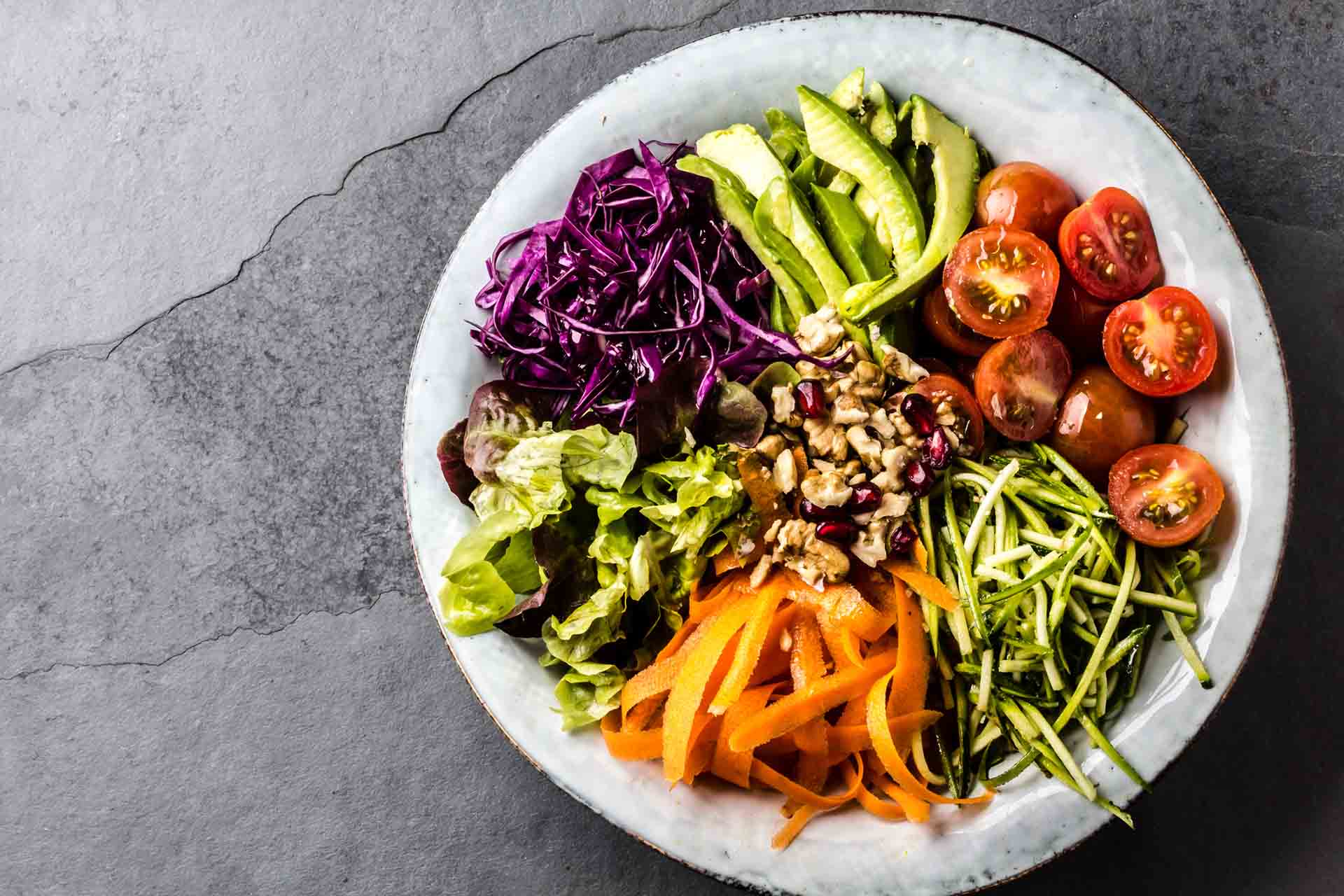What Makes Plant Based Chicken the Go-To Protein for Health Enthusiasts?
What Makes Plant Based Chicken the Go-To Protein for Health Enthusiasts?
Blog Article
Everything About Healthy Food: Advantages of Taking On Plant Based Choices
The discussion surrounding plant-based diet regimens has actually obtained considerable interest in the last few years. Many individuals are checking out the possible health and wellness advantages, nutritional benefits, and ecological effects connected with these nutritional choices. As people come to be a lot more aware of their food's influence on health and sustainability, inquiries emerge concerning the practicalities of embracing such a lifestyle. What particular adjustments can one expect, and just how might these selections reshape not just individual wellness but likewise the world's future?
Recognizing Plant-Based Diets
Lots of people connect plant-based diet regimens mainly with vegetarianism or veganism, these diets can encompass a broad range of eating patterns that focus on whole, minimally processed plant foods. Such diet plans typically consist of fruits, vegetables, whole grains, nuts, seeds, and vegetables, while removing or restricting pet products. This flexibility enables individuals to tailor their dietary selections according to nutritional demands and individual preferences. Some might adopt a primarily plant-based diet while still sometimes consuming meat or dairy, typically referred to as a flexitarian strategy. The emphasis remains on incorporating more plant foods, which can cause a diverse selection of flavors and meals. Understanding these different interpretations of plant-based consuming is vital for valuing its accessibility and appeal in modern food society.
Health And Wellness Perks of Plant-Based Foods
The wellness advantages of plant-based foods are significant, using a nutrient density advantage that supports general health. Research study indicates that these foods can enhance heart health and play a vital duty in effective weight monitoring. By incorporating a lot more plant-based options, people may enhance their nutritional selections and advertise long-term health and wellness.
Nutrient Density Benefit
Nutrient density plays a vital role in the health advantages of plant-based foods, making them a compelling selection for those seeking a balanced diet regimen. Plant-based foods, such as fruits, vegetables, legumes, nuts, and entire grains, are commonly rich in crucial vitamins, minerals, and anti-oxidants while being lower in calories. This high nutrient density enables individuals to eat less calories while still satisfying their dietary requirements. Furthermore, these foods are packed with nutritional fiber, promoting gastrointestinal wellness and helping in weight administration. By integrating nutrient-dense plant-based options, consumers can boost their general wellness, support their body immune systems, and minimize the risk of chronic diseases. Ultimately, the nutrient thickness of plant-based foods highlights their value in a health-conscious way of living.
Heart Health Enhancement

Weight Monitoring Assistance
In addition to advertising heart health, a plant-based diet plan can considerably help in weight monitoring. This nutritional approach highlights whole foods such as fruits, vegetables, beans, nuts, and whole grains, which are typically reduced in calories and higher in fiber contrasted to animal-based products. The high fiber material assists increase satiation, minimizing overall calorie consumption. Plant-based diets are commonly rich in essential nutrients while low in harmful fats, making it simpler to keep a healthy weight. Study shows that people that adopt a plant-based way of life tend to have lower body mass indexes (BMIs) and experience even more effective weight loss compared to those that eat meat-heavy diet plans. Accepting plant-based options is a calculated option for reliable weight monitoring.
Nutritional Worth of Plant-Based Ingredients
Plant-based components are rich in essential nutrients, supplying a diverse selection of vitamins, minerals, and anti-oxidants that add to total health and wellness. A contrast of healthy protein resources exposes that while pet products are commonly deemed premium, lots of plant-based options offer ample protein and various other beneficial compounds. Comprehending the dietary value of these active ingredients can aid people make educated dietary selections.
Essential Nutrients in Plants
Nutrient-rich active ingredients found in plants provide a diverse variety of essential minerals and vitamins that contribute substantially to overall health. These active ingredients are abundant in vitamins A, C, and K, which sustain immune function, vision, and blood clot, respectively. In enhancement, plants give essential minerals such as calcium, potassium, and magnesium, essential for heart health and wellness, muscular tissue function, and bone strength. The presence of fiber in plant-based foods help digestion and advertises a healthy and balanced gut microbiome. Antioxidants, located perfectly in vegetables and fruits, assistance battle oxidative stress and minimize inflammation. Many plant foods are low in calories yet high in nutrients, making them an outstanding choice for those seeking to preserve a healthy weight while making sure perfect nutrient consumption.

Contrasting Protein Sources
Healthy protein sources differ substantially in their dietary accounts, with plant-based active ingredients using one-of-a-kind advantages. Unlike animal proteins, which typically contain hydrogenated fats and cholesterol, plant proteins tend to be reduced in these harmful elements. Legumes, nuts, seeds, and whole grains are abundant in vital amino acids, fiber, vitamins, and minerals. For example, lentils offer high healthy protein content together with considerable iron and folate, while quinoa is a total protein, providing all nine crucial amino acids. In addition, plant-based healthy proteins are commonly come with by anti-oxidants and phytochemicals that support general wellness. The change to plant-based protein resources not only improves nutritional intake yet additionally straightens with lasting dietary practices, decreasing ecological influence and advertising long-term health and wellness benefits.
Environmental Influence of Plant-Based Consuming
As understanding of climate change expands, many people are checking out sustainable dietary choices that can considerably minimize their environmental footprint. Plant-based consuming has become a significant contributor to reducing greenhouse gas discharges, which are mostly associated with livestock production. The growing of fruits, beans, vegetables, and grains commonly requires less sources, such as water and land, compared to pet farming. Additionally, plant-based diets can bring about lowered deforestation, as much less land is needed for grazing livestock or growing pet feed. By changing towards plant-based choices, consumers can support biodiversity and promote much healthier ecological communities. In general, welcoming plant-based eating not only benefits individual health and wellness but also represents a vital action towards ecological sustainability and conservation initiatives.
Conquering Common Misconceptions
While several individuals recognize the benefits of a plant-based diet, several mistaken beliefs frequently discourage them from fully embracing this way of life. A common belief is that plant-based diets do not have sufficient healthy protein; however, various plant sources, such as beans, nuts, and tofu, offer adequate protein. Additionally, some assume that this diet is pricey, when as a matter of fact, staples like beans, rice, and seasonal veggies can be fairly cost effective. An additional misunderstanding is that plant-based eating is extremely restrictive, whereas it actually provides a diverse array of tastes and foods. Numerous fret that a plant-based diet regimen might lead to deficiencies, yet with proper planning, people can get all needed nutrients, including minerals and vitamins, while appreciating a vast range of scrumptious meals.
Tips for Transitioning to a Plant-Based Lifestyle
Making the change to a plant-based way of life can be an enriching experience, though it frequently needs some guidance to navigate the initial modifications. First, individuals are encouraged to start gradually, including even more fruits, veggies, vegetables, and whole grains right into their meals while lowering meat and milk intake. Meal preparation is essential; preparing an once a week food selection can help alleviate the adjustment and prevent final unhealthy choices. Exploring cooking techniques and brand-new recipes can also improve the experience and preserve enjoyment concerning plant-based eating. Furthermore, joining support system or areas can provide motivation and share useful ideas. Finally, staying educated about nutrition assurances balanced meals, protecting against shortages while fostering a healthy and balanced, satisfying plant-based way of living.
Delicious Plant-Based Meal Concepts
Exploring scrumptious plant-based meal concepts can influence people to welcome a more nourishing diet. One preferred alternative is a passionate quinoa salad, featuring cherry tomatoes, cucumber, and a zesty lemon-tahini clothing. Another favorite is a full-flavored lentil stew, packed with carrots, celery, and great smelling natural herbs, best for a reassuring supper. For morning meal, overnight oats made with almond milk, chia seeds, and covered with fresh berries give a nourishing begin to the day. Additionally, a lively vegetable stir-fry with tofu and a selection of vivid veggies can be a fast yet pleasing dish. Velvety avocado salute on whole-grain bread, sprinkled with seeds and flavors, offers a simple yet delicious snack. These dishes display the variety and splendor of plant-based consuming.

Frequently Asked Questions
Can a Plant-Based Diet Supply Enough Protein?
The inquiry of whether a plant-based diet plan can provide sufficient protein prevails. Various resources, including Gluten Free BBQ Sauce legumes, nuts, seeds, and entire grains, can satisfy healthy protein needs efficiently, supporting a balanced and nourishing diet for individuals.
Are Plant-Based Diet Plans Ideal for Kid?
The suitability of plant-based diet regimens for youngsters relies on careful preparation. Appropriate nutrients need to be guaranteed, including minerals, healthy proteins, and vitamins. With correct guidance, such diet plans can support healthy and balanced growth and advancement in youngsters.
Just how Do I Eat Out on a Plant-Based Diet regimen?
Eating in restaurants on a plant-based diet regimen includes looking for dining establishments with varied food selections, asking for alterations, and checking out vegan-friendly choices. Planning ahead and communicating dietary choices can improve the dining experience while preserving nutritional options.
What Are Usual Allergens in Plant-Based Foods?
Common allergens in plant-based foods consist of soy, gluten, nuts, and seeds - Plant Based Chicken. People following a plant-based diet plan needs to know these irritants and read labels thoroughly to stay clear of negative responses and ensure secure usage
Can Plant-Based Diets Aid With Weight Reduction?
Research study suggests that taking on a plant-based diet regimen might help with weight-loss because of its normally lower calorie thickness and greater fiber content. This mix can boost satiety, assisting people handle their caloric consumption efficiently. Many individuals link plant-based diets primarily with vegetarianism or veganism, these diet plans can incorporate a vast variety of eating patterns that focus on whole, minimally refined plant foods. Nutrient thickness plays a crucial role in the health and wellness advantages of plant-based foods, making them an engaging selection for those seeking a well balanced diet plan. Plant-based diet plans have been shown to considerably improve heart health and wellness, as they commonly contain elements that sustain cardiovascular function. In addition to advertising heart health and wellness, a plant-based diet plan can considerably assist in weight administration. A typical belief is that plant-based diet regimens do not have adequate protein; nevertheless, many plant sources, such as vegetables, nuts, and tofu, give enough healthy protein.
Report this page